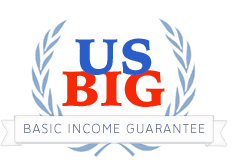Basic Income and Minimum Wage
By: Sara Bizarro (Research Fellow, University of Minho)
The most minimal way of defining Basic Income is to say that it is a proposed social policy essentially characterized by distributing cash rather than goods or services, to guarantee a minimum floor below which no one will fall. Beyond this minimal definition, some writers, such as Philippe Van Parijs, have argued that Basic Income is also unconditional, distributed at an individual level, and universal, among other things.
There isn’t a clear line between these more robust definitions and different models of Basic Income. Different models can have elements that are closer to the core, such as unconditionality, and other elements that are further from the core, such as a specific relationship between Basic Income and Minimum Wage. In this blog post, I will analyze the relationship between Basic Income and Minimum Wage.
Basic Income, in itself, if we use the minimal definition above, does not necessarily imply anything regarding Minimum Wage policy. However, in the late 60s, when Nixon’s Family Assistance Plan was discussed in Congress, some Democrats were against the policy and mentioned how it could potentially interact with Minimum Wage. Basic Income is an interesting policy because of the way it can influence many other policies; since it is a support given in cash, and cash can be used in many different ways, other policies that can be partly substituted by cash can be put into question when a Basic Income is implemented.
Van Parijs, for example, says if we implement a Basic Income, we could do away with Minimum Wage. Supposedly, Basic Income would allow for workers to have a stronger bargaining position. Workers would be able to refuse work that is not paid adequately and that is not satisfying. On the other hand, workers could accept work that is barely paid, if that interests them, for personal reasons. This could lead to a radical change in the world of work; we could, for instance, have janitors who make more than professors (if we assume that being a professor is something more desirable than being a janitor).
However, if Basic Income were indeed to undermine Minimum Wage laws, there is a concern that companies could take advantage of this new policy to lower their already stagnant and extremely low wages. If this became a trend, it could create a situation where the power of the workers to say “no” is not guaranteed by Basic Income alone. There are two key points to consider here: first, in order for Basic Income to provide the power to say “no”, it would have to be at the level of a middle class income; it would have to guarantee one can make rent, food, utilities, education, healthcare and some basic entertainment in the area where one has family, roots, or wants to live in for a variety of reasons. It is questionable whether such a level of Basic Income is financially possible. Second, the power to say “no” also assumes that there are multiple job options available and that some options are better than others. If, for instance, most large employees reduced their wages, then the “good” options would be cut down significantly for a large segment of the population. Combine that with automation, and you have a situation where jobs are very scarce and therefore workers would take anything that is given to them.
The two issues above seem legitimate concerns, and because of them, I think there is a good reason to defend a Basic Income that is accompanied by a Minimum Wage policy. However, Minimum Wage does not need to be a one-size-fits-all policy. An ideal Minimum Wage policy, if supported by a Basic Income, could be flexible and recognize differences in wage depending on a company’s profits and volume of business. There could be a Minimum Wage for large, very profitable corporations, such as Amazon or Walmart, and a Minimum Wage for local business. The implementation of a Basic Income could be used to justify this by saying that large profitable companies have to share the social responsibility. For example, if we use the model proposed by Karl Widerquist in “The Cost of Basic Income, Back-of-the-Envelope Calculations”, a Basic Income policy would have a clawback rate of 50% (or as an alternative, a gradual clawback rate as a worker’s salary increases), and we could argue that companies that can afford it should pay their workers enough that they do not need their Basic Income share. (Note: A clawback rate means we would have a marginal tax so that if someone is able to make twice as much as the Basic Income payment, say, they would start to pay it back in taxes.)
The idea behind a variable Minimum Wage policy could also be argued for by saying that we should prevent the predatory behavior of companies, especially if that behavior ends up costing public funds. This already happens with companies like Walmart that pay just below the threshold that allows their employees to benefit from Social Security payments, Medicare and Food Stamps, something that should not be allowed if the companies have the fiscal ability to cover the costs of these benefits for their employees.
For the reasons described, my opinion is that even though Basic Income does not necessarily imply anything about Minimum Wage, it should still be combined with a Minimum Wage policy that is flexible and prevents predatory behavior from the companies, so that social responsibility is shared by all, and so that all can benefit in a fiscally responsible way.
Image: “Wage” by Nick Youngson CC BY-SA 3.0 Alpha Stock Images





Leave a Reply
Want to join the discussion?Feel free to contribute!